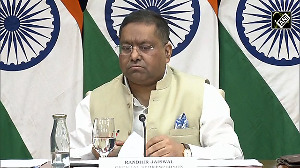From Europe and North America, India's offshore workers -- call centre operators, data entry clerks and telemarketers -- may seem like the sweatshop labourers of the information age, toiling long hours for meager pay.
But an international alliance of unions that wants to organise them is finding a very different reality in India: many think of themselves as members of a relatively well-paid, respected professional elite in no need of a union's protection.
"I know these young people have a negative image about unions," says Narayan Ram Hegde of Union Network International, a global alliance of 900 unions.
But "these professionals are more like cyber coolies," he said. "We hope we will be able to convince them over time."
Hegde is leading the UNI drive to unionise workers in India's back-office outsourcing industry -- a sector that employs about 350,000 people and is expected to add 80,000 jobs this year.
UNI has been quietly setting up the union for the past year -- its formal launch date was September 18. But it has so far only managed to attract about 500 recruits, underscoring workers' hostility to unions and the enormity of the task faced by organisers.
"A union would make sense if there was no job security," said K V Sudhakar, who does technical support work in IBM's offshore outsourcing centre in Pune. "Here jobs are more, people are less -- companies are trying all means possible to keep employees happy so that they won't leave."
It's not the first time UNI has encountered such sentiments. A previous effort to start a union for Indian software programmers -- the highly skilled elite of the business -- flopped in 2000 after the programmers baulked at joining, offering similar reasons.
A similar situation is playing out in the United States where, with manufacturing jobs disappearing, many union leaders say they must organise high-tech workers and academics to survive. But the Communications Workers of America has had a tough job trying to organise white-collar workers at companies such as IBM Corp and Microsoft Corp.
Global companies have increasingly farmed out any task that can be done over a computer network to low-wage countries. India is the undisputed king of the business with 44 per cent of the global market and an industry that earned revenues of $17.2 billion in 2004.
For UNI, the union drive is critical because jobs outsourced to India cut into the unions' traditional pool of members in Europe and North America.
"We lose members (in the West) because of outsourcing," Hedge says. Setting up new ones in India "will help us have the same negotiating power."
He says the new union can help the industry's workers win better conditions.
The work can be monotonous and grinding -- fielding calls from irate Americans whose computers are crashing; spending eight hours plugging numbers into a Dutch bank's database; deciphering hundreds of X-rays of sick Europeans in a single shift.
Burnout is common and three out every 10 workers change jobs a year. Hard figures are difficult to come by, but industry experts say that stress forces one in seven workers to leave the industry every year.
Among those who decided to join the union is Raghavan Iyengar, a call centre supervisor in Bangalore. He said companies give incentives for those who work extra time, and young workers often ignore health problems, such as insomnia and back pain, to earn those extra bucks.
"The industry's motto is 'shut your mouth and take your money.'" he said. "We want to change that."
But the money can be a powerful lure in India, where per capita income hovers around $500 a year and most people make much less toiling in dusty fields or on steaming city streets.
Call centre rookies, in contrast, make about $2,400 a year -- roughly twice the pay of first-year teachers, accountants or lawyers -- and work in air-conditioned offices, many of which have health clubs and well-stocked cafeterias. With experience, the salaries multiply.
The easy money is on display every Friday evening in Bangalore -- the industry's centre -- where young workers unwind after a week of work in the posh clubs and restaurants that have grown with the outsourcing business.
As for complaints about working conditions, Ruchinder Singh, who works in Hyderabad for GE Capital International, said he can take them straight to his company's chief executive.
"When my CEO will listen to what I have to say, then why do I need union?" asked Singh, who helps customers around the world use specialised software programmes.
"We have a structure in place where the management is constantly in touch with teams and responds within 24 hours to any complaint," he said. "We are not factory workers, we are knowledge professionals -- every employee is treated as an asset in this industry."
Back-office workers are typically college graduates in their 20s and early 30s and drawn from India's urban middle and upper classes -- their parents are lawyers, doctors and small and large business owners.
Such a background does not make them fertile recruits for union organisers, said H S Sudarshan, a former call centre worker and now a recruitment consultant.
Faced with problems, he said, most just quit and take a better job.
"There is opportunity everywhere," he said. "A new job is a better solution than union."






 © 2025
© 2025